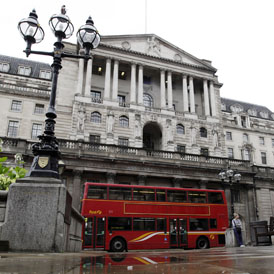Bank resists call to boost money supply
The Bank of England holds interest rates at 0.5 per cent and refuses to extend its quantitative easing programme to boost the supply of money in the economy.

The Bank of England has elected to keep interest rates at a record 0.5 per cent but stopped short of extending the £200bn quantitative easing programme.
Holding interest rates will be welcomed by borrowers, with the price of a fixed rate mortgage now at an all-time low as lenders factor in a longer spell with the Bank’s base rate at rock-bottom.
But the extended period of lower lending costs spells more misery for pensioners and savers, who will continue to suffer low returns on their money at a time when high inflation is eroding the value of their deposits.
The Bank’s Monetary Policy Committee decided against taking emergency measures to boost the amount of money in the economy, despite calls from business leaders and economists to extend quantitative easing (QE).
British Chambers of Commerce chief economist David Kern said: “The MPC must keep interest rates as low as possible for as long as possible, and will have to start thinking about an early injection of additional QE.”
MPC member Adam Posen has been the Bank’s lone voice in calling for more QE but minutes of last month’s meeting showed other members were now considering the option. Two members also dropped calls for higher borrowing costs.
Such a move would be a high-risk strategy because it could fuel inflation, which is well above target at 4.4 percent, putting more pressure on household budgets.
Soft manufacturing growth, a contraction in the powerhouse services sector and increased global uncertainty – reflected in recent stock market turmoil – have prompted a raft of forecasters to slash economic predictions.
The OECD warned on Thursday that it fears the global economy is close to grinding to a halt as increased uncertainty hampers growth. Its central forecast for the UK in the final quarter of 2011 is for annualised GDP growth of just 0.3 per cent, compared with 2.5 per cent growth last autumn.
Chancellor George Osborne signalled this week that GDP forecasts were set to be downgraded in his autumn statement on 29 November.
But he insisted that the government would stick to its deficit reduction plan, which he described as “the rock of stability upon which any sustainable recovery depends”.